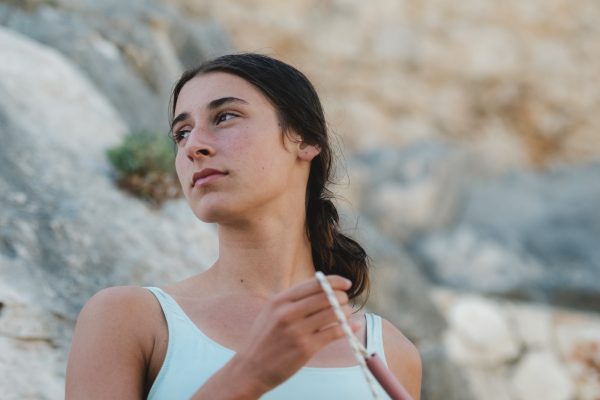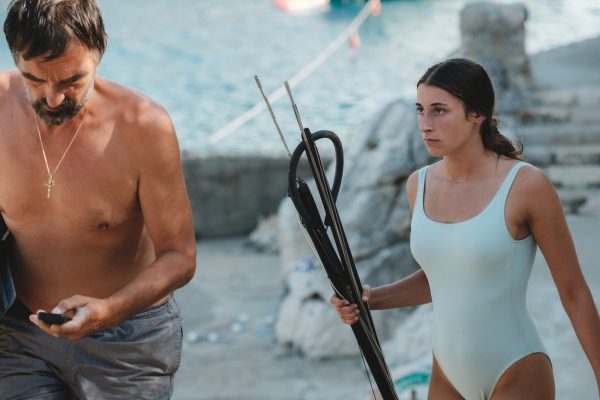Jasmine Valentine chats with Murina director Antoneta Alamat Kusijanović…
With its UK wide release on April 8th, Murina is a film that’s already been on an incredible journey. Originating from the 2017 short film Into The Blue, the feature-length adaptation has gone on to win the Camera D’or at the 2021 Cannes Film Festival, with backing from Martin Scorcese’s Sikelia Productions. Although never originally the plan, Antoneta Alamat Kusijanović has effortlessly made her directorial mark with her debut feature Murina.
Living on an idyllic Croatian island, teenager Julija (played by Gracija Filipović) is at odds with her father. Controlling in the wants of his daughter, the family tension escalates when wealthy friend Javier (Cliff Curtis) comes to stay. A heady concoction of decades of emotion, the events of a few days in paradise are set to change everything.
Congratulations on such a captivating film. As Murina hits the UK on April 8th, are you pleased with the film’s journey so far?
I think the film really surprised us. It’s really had an incredible festival journey, but more importantly, it’s been very well received by audiences. I get a lot of emails from people who aren’t in the film industry about how inspired they were by this story. That really makes me happy.
Did you always know that your short Into The Blue had the potential to be a feature?
No, I didn’t have any idea when I was making the short that I would do a feature. I really wrote it for Gracija Filipović (Julija)—I really felt she deserved this coming-of-age feature before she stepped into adulthood. I really wanted to capture her at that particular stage in life.
Was it important for you to tell this story in your native Croatia?
Looking back, it was. If you asked me before I shot the film, I would say it’s a universal story that could have been told anywhere. Of course, I wanted to make my first film in my home country. But digging deeper into the mentality and behaviour through the process of shooting and manifesting showed it was a good decision to shoot in Croatia. I think it’s really important to exercise something about our culture.
Many other outlets have billed Murina as a coming-of-age story, but it feels so much more than that. Is it a label you’re happy with?
Absolutely. Coming-of-age was never a movie I wanted to make, but it’s an easy label to make in the moment when you have a teenager among adults discovering new things. But actually, for me, it’s a coming-of-age of all the characters. We are coming of age at every age. It’s not fair to come of age only at 17 when these changes—physical, hormonal, emotional, psychological—are happening in 5-year turns. It’s a coming-of-age story, but not a ‘coming of teenage’ story.
The feeling of being the only child in a room of adults was something I personally resonated with. Did that come from personal experience?
No—I have a big family with quite a lot of children. I wanted to portray a child that’s the only adult among grown-up kids. I wanted to show this immaturity and pretend confidence that we have as adults, which is really as thin and transparent as water.
There also feels like there are perceptions of feminism in practice (or a lack of). Does that stem from your personal feelings coming into the project?
Yes. It started slow and soft—and then it became a roar. Especially by making this film with so many women, it confronted this society within which I had to make a movie. What happens to these women on screen happened to me behind the camera. Real life enforces Murina in the end. It becomes one homogenous thing. That’s where it’s fun.
There are so many beautiful shots in the film that evoke a suspension of time—especially when they’re set in the water. Was that a conscious decision, or a by-product of the process?
I have a very strong connection to water. When you plunge into the water, everything changes and shifts. You’re in a different state of sound and vision, even breathing. There is that sensation of things—you’re transported to another universe. I have a feeling that everything works in a different rhythm underwater. So yes, a conscious decision. I really wanted to portray the water as a space where Julija can want, desire, aim for it and spill blood.
As an end-product, it feels like quintessential cinema. There’s a sense of epicness to how much importance you’re packing into Murina. Was that feeling your end goal?
I wanted to use all the possible emotional tools available to me. I wanted to journey my audience through the thrill and empathy of it, the remorse and envy. Something unhinged. The impossibility to hold onto your impulses. Sensuality and sexuality. I think it’s important that all of these emotions that escalate us finally remind us of the resilience we have as teenagers. That’s liberating to me. That’s the journey that I think was necessary to achieve.
I have to ask—what was it like working with Scorcese’s production company?
Very nice! They came on board with RT Features and had a fund to support first and second time filmmakers. I sat down with him before we started production, and it was very surreal to talk to Martin Scorcese right out of school for three hours about movies. Once I finished shooting, I shared a cut with him—he watched two or three cuts and gave his notes—it was nice to get that wind up your back from a master saying “you know what’s best for your film.”
What’s next for you?
You never know what’s next. I’m hoping this script that I’m writing is going to be produced within the scope I would want it to be. I’m not going far from the questions that I’m starting to ask in Murina—it’s definitely a next stage of life that I’m depicting. The questions that are the underbelly of Murina are becoming the fore of this next film, with motherhood as a centrepiece.
SEE ALSO: Read our ★ ★ ★ ★ review of Murina here
Murina is released in cinemas nationwide on April 8th, with Q&A screenings with the director this weekend (see details here: https://www.modernfilms.com/murina)
Jasmine Valentine – Follow me on Twitter.














